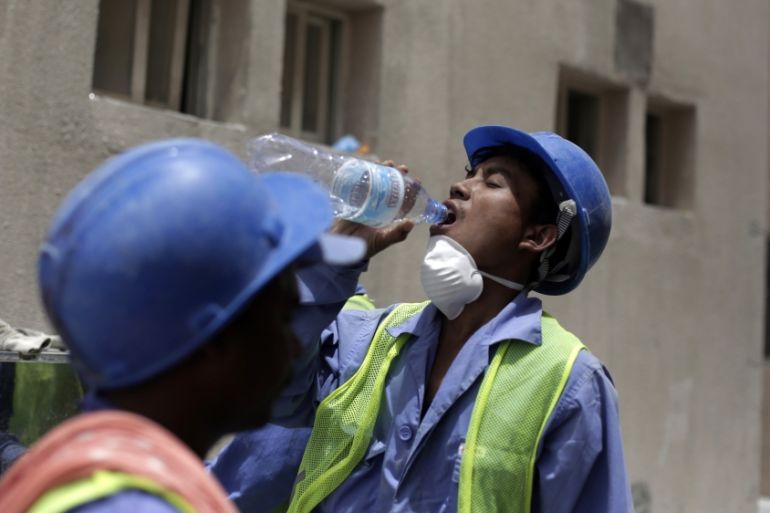Amnesty criticises Qatar on migrant labour rights
Rights group says Gulf nation failing workers and says FIFA should pressure Qatar to do more ahead of 2022 World Cup.

Qatar has done little to improve conditions for migrant workers despite promising reform last year, rights body Amnesty International has said in a new report.
Amnesty said in a briefing that little had changed for the 1.5 million migrant workers and that football’s governing body FIFA had a “clear responsibility” to put pressure on the Qatari authorities to do more as the country prepares to host the 2022 World Cup.
Keep reading
list of 4 items‘Can’t give them jobs’: Rwandans grapple with fears over UK asylum plan
‘It feels personal’: Residents fight Melbourne tower block demolition plan
‘Children of the Ganges’ — The boatmen of India’s Varanasi
The lack of a clear roadmap of targets...leaves serious doubts about Qatar's commitment to tackling migrant labour abuse.
“Without prompt action, the pledges Qatar made last year are at serious risk of being dismissed as a mere public relations stunt to ensure the Gulf state can cling on to the 2022 World Cup,” researcher Mustafa Qadri said ahead of Amnesty’s report being released on Thursday.
“Qatar is failing migrant workers. Last year the government made promises to improve migrant labour rights in Qatar, but in practice, there have been no significant advances in the protection of rights.”
The report rated Qatar’s response to nine migrant labour rights issue, saying only “limited progress” had been made in five items while the authorities have “failed to make any improvements” in the other four.
“The lack of a clear roadmap of targets…leaves serious doubts about Qatar’s commitment to tackling migrant labour abuse,” said Qadri.
“[FIFA] has yet to demonstrate any real commitment to ensuring Qatar 2022 is not built on a foundation of exploitation and abuse,” he added.
Qatar disagrees
But Qatar’s Ministry of Labour and Social Affairs said in a statement that “significant changes have been made over the last year to improve the rights and conditions of expatriate workers”.
“The Ministry of Labour and Social Affairs (MOLSA) appreciates the work and effort involved in this latest report on the State of Qatar by Amnesty International, but we disagree with a number of its claims,” the statement said.
“No one should be in any doubt that we are committed to effective and sustainable change. MOLSA will continue working closely with NGOs, international organisations and the business community to deliver this commitment.”
The oil-rich nation unveiled proposed labour reforms one year ago including the replacement of a contentious sponsorship law, known as “kafala”, in which workers need their employer’s permission to change jobs.
It was also announced that an exit permit law requiring workers to obtain an employer’s consent to leave Qatar would also be reformed. However, Amnesty said there had been “no progress whatsoever” on these items.
Earlier this month Abdullah bin Saleh al-Khulaifi, the minister of labour and social affairs, said he was “90 percent” certain the kafala system would be replaced by the end of 2015.
He added that the wage protection system would be up and running by mid-August as well as improvements to workers’ accommodation.